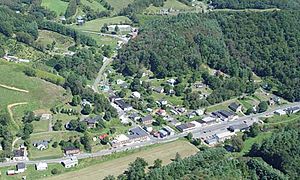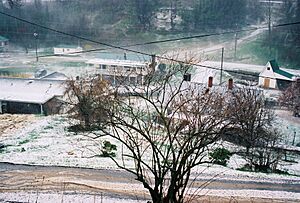Lansing, North Carolina facts for kids
Quick facts for kids
Lansing, North Carolina
|
|
|---|---|

Aerial Photo of Lansing
|
|

Location of Lansing, North Carolina
|
|
| Country | United States |
| State | North Carolina |
| County | Ashe |
| Area | |
| • Total | 0.38 sq mi (0.98 km2) |
| • Land | 0.37 sq mi (0.96 km2) |
| • Water | 0.01 sq mi (0.02 km2) |
| Elevation | 2,654 ft (809 m) |
| Population
(2020)
|
|
| • Total | 126 |
| • Estimate
(2021)
|
127 |
| • Density | 340.54/sq mi (131.63/km2) |
| Time zone | UTC-5 (Eastern (EST)) |
| • Summer (DST) | UTC-4 (EDT) |
| ZIP code |
28643
|
| Area code(s) | 336 |
| FIPS code | 37-36960 |
| GNIS feature ID | 2405986 |
Lansing is a small town in Ashe County, North Carolina, United States. It's known as a resort town and had 126 people living there in 2020.
Lansing is a favorite spot for people who are retired and for tourists. Many visitors come from places like Florida, the lower parts of the Carolinas, and Georgia.
Contents
A Look Back: Lansing's History
Lansing officially became a town on May 16, 1928. It's a very small town, so small that it only has one stop sign! This stop sign is at the crossing of NC Highway 194 and Big Horse Creek Road.
Busy Times: Railroads and Mines
In the early 1900s, Lansing was a very busy place. This was mostly because of the Norfolk and Western Railroad Company. Their daily train, called the "Virginia Creeper", would stop here. Towns like Todd, West Jefferson, and Lansing were regular stops.
There were also some active iron mines near Lansing. These mines used the railroad to transport the iron ore they dug up.
Local Industry: Cheese and Schools
In the 1930s and 1940s, Lansing had one of only two cheese factories in Ashe County. This factory was very helpful for local farmers. They could bring their milk and other goods here instead of traveling all the way to the other cheese plant in West Jefferson.
Lansing High School was built in 1941. It was constructed by the Works Progress Administration (WPA), a government program that created jobs during the Great Depression. The school was built using beautiful local granite stone.
Historic Places in Lansing
Several important places in Lansing are listed on the National Register of Historic Places. This means they are recognized for their historical importance. These include:
- The Clark-Miller Roller Mill
- The Lansing Historic District
- The Lansing School
- The Miller Homestead
- The Perry-Shepherd Farm
Where is Lansing?
Lansing is a small town in terms of size. According to the United States Census Bureau, the town covers about 0.9 square kilometers (0.35 square miles). A small part of this area, about 0.02 square kilometers (0.01 square miles), is water.
Who Lives in Lansing?
The number of people living in Lansing has changed over the years:
| Historical population | |||
|---|---|---|---|
| Census | Pop. | %± | |
| 1960 | 278 | — | |
| 1970 | 283 | 1.8% | |
| 1980 | 194 | −31.4% | |
| 1990 | 171 | −11.9% | |
| 2000 | 151 | −11.7% | |
| 2010 | 158 | 4.6% | |
| 2020 | 126 | −20.3% | |
| 2021 (est.) | 127 | −19.6% | |
| U.S. Decennial Census | |||
In 2000, there were 151 people living in Lansing. All of the residents were identified as White. The average age of people in the town was 37 years old.
See also
 In Spanish: Lansing (Carolina del Norte) para niños
In Spanish: Lansing (Carolina del Norte) para niños
 | William L. Dawson |
 | W. E. B. Du Bois |
 | Harry Belafonte |


